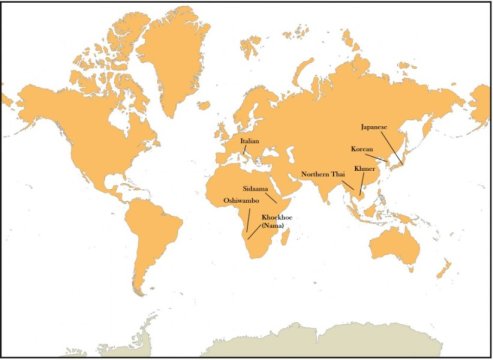[ad_1]
Memory plays a crucial role in our lives, and several studies have already investigated how we store and retrieve information under different conditions. Typically, stimuli presented at the beginning and at the end of a list are recalled better than stimuli from the middle. But are these findings universal and generalizable across languages and cultures?
The group, including psychologists, linguists and biologists from five different countries, traveled across the world to run memory tests in eight different human cultures speaking different languages. “The best part of this project was to cross deserts and seas to reach amazing people speaking the most wonderful languages ever, from Sidaama, to Khoekhoe and Khmer,” says Amici, “and know that these languages may provide them with a unique vision of the world.”
The relationship between language and thought is controversial. One hypothesis is that language fosters habits of processing information that are retained even in non-linguistic domains. Languages, for instance, vary in their branching direction. In typical right-branching (RB) languages, like Italian, the head of the sentence usually comes first, followed by a sequence of modifiers that provide additional information about the head (e.g. “the man who was sitting at the bus stop”). In contrast, in left-branching (LB) languages, like Japanese, modifiers generally precede heads (e.g. “who was sitting at the bus stop, the man”). In RB languages, speakers could process information incrementally, given that heads are presented first and modifiers rarely affect previous parsing decisions. In contrast, LB structures can be highly ambiguous until the end, because initial modifiers often acquire a clear meaning only after the head has been parsed. Therefore, LB speakers may need to retain initial modifiers in working memory until the head is encountered to comprehend the sentence.
By providing participants with a series of classic memory tasks, the research team could compare their performance when recalling words, numbers and spatial stimuli. “The main finding of the study is that left-branching speakers were better at remembering initial stimuli across verbal and non-verbal working memory tasks, probably because real-time sentence comprehension heavily relies on retaining initial information in LB languages, but not in RB languages,” says Alejandro Sanchéz Amaro, currently in the Department of Cognitive Science at the University of California, San Diego.
The main novelty of this study is that the link between language and thought might not be just confined to conceptual representations and semantic biases, but rather extend to syntax and its role in our way of processing sequential information. The language we speak affects the way we process, store and retrieve information. The fact that branching and word order may be linked to such a fundamental cognitive process like memory opens up new exciting avenues for psycholinguistic research towards expanding the pool of languages and populations investigated. “What about the working memory of speakers of languages with mixed branching or free word order? Would we find people who are equally good at remembering initial and final items? And maybe at remembering the items in the middle?” says Federico Rossano, from the University of California, San Diego. With more than 7,000 languages in the world, we have a uniquely rich pool to study the relation between language and cognition. Preserving and investigating the wealth of this diversity is not only ethical, but also scientifically crucial to ultimately understand which factors shape the way we think and better comprehend the relation between language and thought.
Story Source:
Materials provided by Max Planck Institute for Evolutionary Anthropology. Note: Content may be edited for style and length.
[ad_2]















